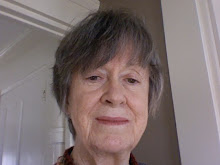Yesterday I drove to Portland to St. Luke's Cathedral to renew my ordination vows, pick up some blessed oil for baptisms and anointing the sick and to have lunch with my colleagues. The service was wonderful as always, but it seemed more meaningful this year. Lay people were specifically included through our renewal of our baptismal covenant. Bishop Steve spoke of how strange it felt for him to renew his vows as a bishop [at the last meeting of the College of Bishops] with only bishops present because as Episcopalians we acknowledge four orders of ministry: lay, deacon, priest and bishop. At the altar were two deacons (both female), three priests (two men, one woman) and, of course, the bishop at the altar. There was also the Verger, the Cross Bearer and Two Torch Bearers (lay). All four orders were visibly present.
After we renewed our baptismal vows, the bishop addressed the deacons: "Deacons, do you reaffirm your promise to look for Christ in all others, being ready to help and serve those in need?"
Then he addressed us priests: "Priests, do you reaffirm your promise to minister the Word of God and the Sacraments of the New Covenant, that the reconciling love of Christ may be known and received?"
And then all the people (lay and ordered) addressed the bishop: "Bishop, do you reaffirm your promise to share with your fellow bishops in the government of the whole church; will you sustain your fellow presbyters and take counsel with them; will you guide and strengthen the deacons and all others who minister in the Church, so that they may join in the evangelization of the world?"
Then we ALL said together "May almighty God, the Father of our Lord, Jesus Christ, who has given us a new birth by water and the Holy Spirit, and bestowed upon us the forgiveness of sins, give us the grace to uphold and perform our vows."
What this service brought to my mind was Bill Countryman's book "Living on the Border of the Holy: Renewing the Priesthood of All." I spent about 15 minutes looking for it on my bookshelf, and when I found it discovered I had put a sticky note on page 186. I'm not sure why I marked this page before, but what struck my eye this morning and that seems so appropriate for Holy Week is on the next page:
It is love that permits us to accept the services of others as our priests [Countryman is using the term "priest" here in its most general sense]. We can trust others as priests only if we are persuaded that they have a genuine reverence for us and care more for our well-being than for their own authority. The priest who is mainly interested in a fee of some sort is not a true priest. The fee in question may be material, or it may be emotional or spiritual. The priest may want to get rich, for example, or to gain intimate power over the lives of others, to get and hold a reputation for being always right or to be praised as superhumanly supportive. There is a multitude of such temptations in the path of the priest, and the priest who loves the fee rather than the neighbor has failed an essential test of priesthood.
Love demands its own integrity.Countryman goes on to explain that it is what we do in love, for the good of the other that is important. When we try to get a "fee" of any sort (money, respect, compliments or reputation) we end up trying to control the other person, attaching them to ourselves rather than to God.
Love implies reverence for one another. In every person, ourselves included, we see one who God has created, chose, loved, forgiven, welcomed, and celebrated. We therefore see each person as a complex and beautiful mystery, worthy of all this outpouring of God's gifts......The mystery is to be honored in both of us. Love in the honoring of it.The honoring of the four-fold orders of the church is the honoring of the love that comes from the Creator. Each of us have gifts and, in community, those gifts can help bring about God's kingdom. The more we see the gifts in others (and ourselves) and recognize that we all each called to be priests to each other, the more we live into the life as a follower of the Christ, the great High Priest. We all fall short of that ideal, but with God's grace we can make a difference in our broken and needy world.








No comments:
Post a Comment